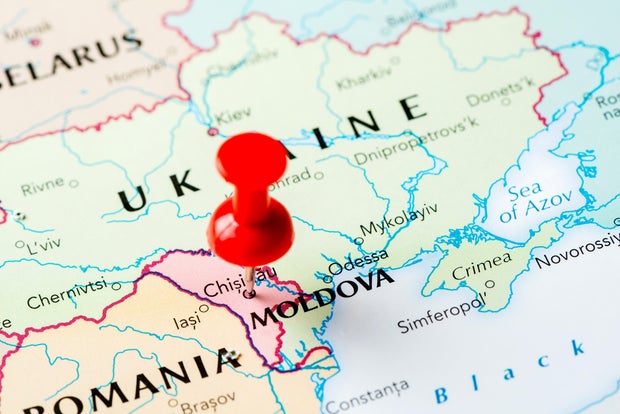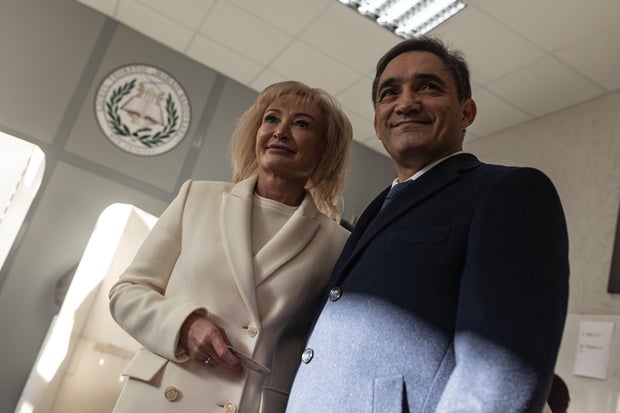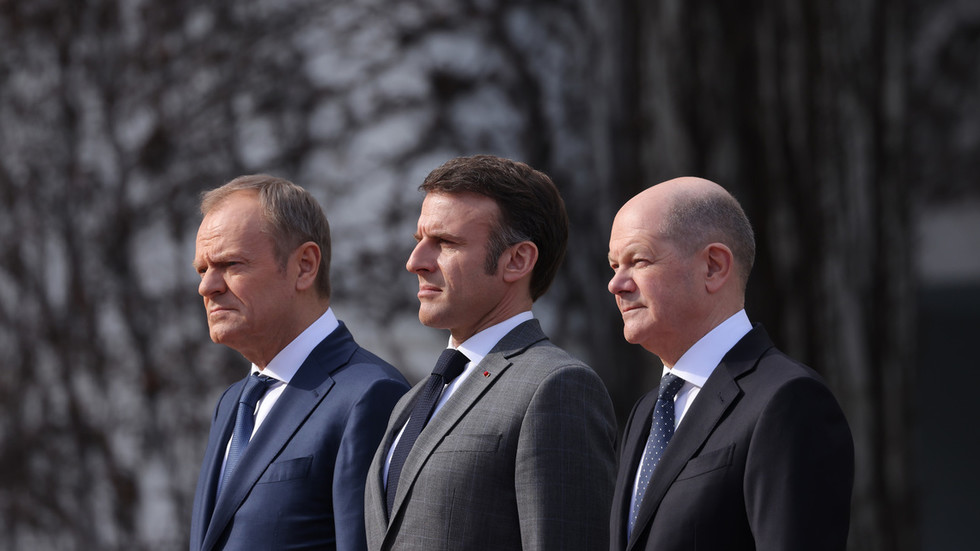U.S. accuses Russia of election misinfo
Moldova's pro-European Union incumbent President Maia Sandu won a tense presidential runoff election Sunday, beating a rival backed by a pro-Russian party in what she called as a "lesson in democracy."
The election in the small ex-Soviet republic, which lies sandwiched between war-torn Ukraine and the European Union, was overshadowed by allegations of meddling by Moscow. The key vote took place just two weeks after a referendum saw Moldovans back their country's bid to join the EU by a razor-thin margin.
Sandu won 54.94 percent of the vote compared to 45.06 percent for Alexandr Stoianoglo, who was supported by the pro-Russian Socialists party and whom Sandu fired as prosecutor general last year, according to near-complete results published by the country's election commission.
 Moldova's incumbent President and presidential candidate Maia Sandu celebrates with staff and supporters following preliminary results of the second round of the presidential election, in Chisinau, Moldova, Nov. 3, 2024.
DANIEL MIHAILESCU/AFP/Getty
Moldova's incumbent President and presidential candidate Maia Sandu celebrates with staff and supporters following preliminary results of the second round of the presidential election, in Chisinau, Moldova, Nov. 3, 2024.
DANIEL MIHAILESCU/AFP/Getty
"Today, dear Moldovans, you have given a lesson in democracy, worthy of being written in history books.... Freedom, truth, and justice have prevailed," Sandu declared.
Her rival Stoianoglo, 57, urged people "to remain calm, regardless of the figures," but the Socialists party that backed him was quick to release a statement Monday questioning the results and calling her "illegitimate," without offering any specific evidence.
"Maia Sandu is an illegitimate president, recognized only by her sponsors and supporters abroad. The people of Moldova feel betrayed and robbed," the party claimed in a statement, decrying "blocking of voters' access" and other alleged irregularities in the vote, in which Sandu benefitted from strong support from the country's large diaspora.
Biden says democracy won, "Russia failed."
In a statement issued Monday morning by the White House, President Biden said the Moldovan people "went to the polls and voted in favor of President Sandu's vision for a secure, prosperous, and democratic Moldova."
"For months, Russia sought to undermine Moldova's democratic institutions and election processes. But Russia failed," Mr. Biden said. "The Moldovan people have exercised their democratic right to choose their own future, and they have chosen to pursue a path aligned with Europe and democracies everywhere."
EU chief Ursula von der Leyen congratulated Sandu on her re-election victory and the country's "European future," saying it took "a rare kind of strength to overcome the challenges you've faced in this election."
French President Emmanuel Macron said democracy had "triumphed over all interference and all manuevers."
Sandu's victory was also applauded by Ukraine's President Volodymyr Zelenskyy on Monday. His country, which Russia launched its ongoing full-scale invasion of almost three years ago, surrounds Moldova on three sides.
 Getty
Getty
"Moldovans have made a clear choice," Zelenskyy said Monday. "They chose a path toward economic growth and social stability."
He vowed to strengthen Ukraine's ties with Moldova and noted that both countries had applied to join the EU in the wake of Russia's February 2022 invasion.
"Only true security and a peaceful, united Europe can guarantee each person and every family the confidence to face tomorrow with hope and certainty," he said.
Accession negotiations for Moldova to join the EU formally opened in June. In the October 20 referendum, 50.35 percent of voters backed EU membership, with Sandu blaming "foreign interference" for the narrow result in the country of 2.6 million people.
"Attacks, provocations and attempts at destabilization"
Like in Georgia, another ex-Soviet country where the ruling party won a contested parliamentary election last weekend, Russia has been accused of seeking to sway voters. Moscow has denied the allegations.
Police said after the EU referendum that they had uncovered a Russian vote-buying scheme that could have affected up to a quarter of the ballots, and Moldovan authorities reported "attacks, provocations and attempts at destabilization" on Sunday.
Police said they were investigating Russia's alleged use of "organized transportation" to Belarus, Azerbaijan and Turkey so people living in Russia could vote at Moldovan missions in those countries.
Cyberattacks and fake bomb threats also targeted out-of-country voting operations, authorities said.
A deeply divided Moldova
Turnout was higher than in the first round on October 20, when Sandu came out ahead with 42.5 percent and runner-up Stoianoglo got 26 percent.
Casting his vote on Sunday, Stoianoglo said he had "no relations with the Kremlin."
 Alexander Stoianoglo, presidential candidate of the Party of Socialists of the Republic of Moldova, votes with his wife in the presidential elections in Moldova, in Chisinau, Nov. 3, 2024.
Diego Herrera Carcedo/Anadolu/Getty
Alexander Stoianoglo, presidential candidate of the Party of Socialists of the Republic of Moldova, votes with his wife in the presidential elections in Moldova, in Chisinau, Nov. 3, 2024.
Diego Herrera Carcedo/Anadolu/Getty
While he's said he also favors joining the EU, he boycotted the referendum.
Moldova is deeply polarized. A large diaspora and the capital mostly favor joining the EU, while rural areas and the pro-Russian separatist regions of Transnistria and Gagauzia are against it.
Sandu lost in the territory of Moldova itself, election results showed, with her owing her victory to the diaspora.
"This is what tipped the election," said Florent Parmentier, a political scientist at Paris-based Sciences Po, noting Sandu's "dependence on the outside."
To maintain its pro-EU course, Moldova needs "a lot of help" given "the hybrid war waged by Russia," according to Andrei Curararu, an analyst at the Chisinau-based WatchDog think tank.
"It will not succeed on its own," he said, earlier citing "unprecedented pressure" with more than $100 million estimated to have been spent on "destabilization activities."











 English (US) ·
English (US) ·